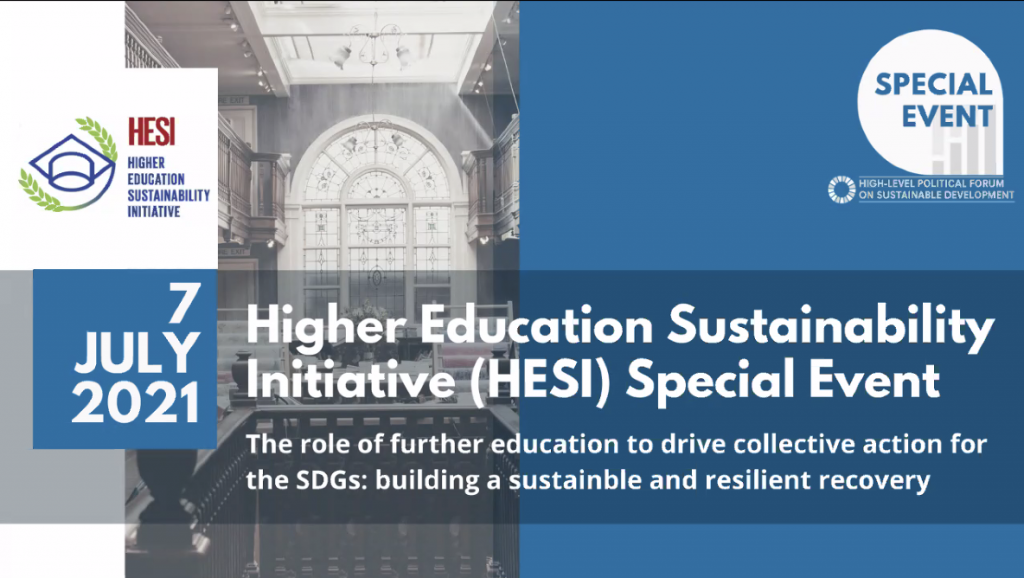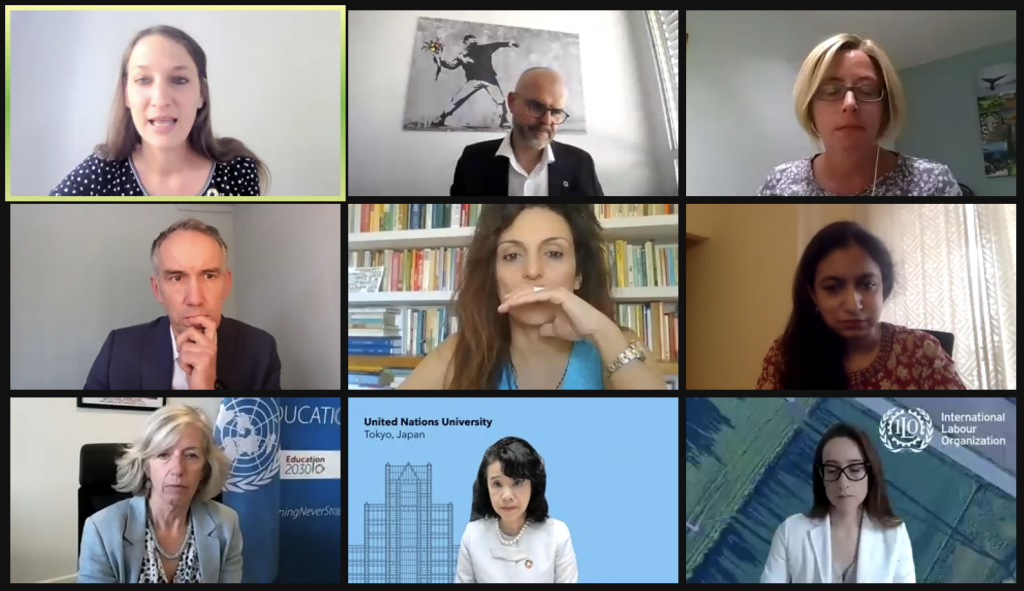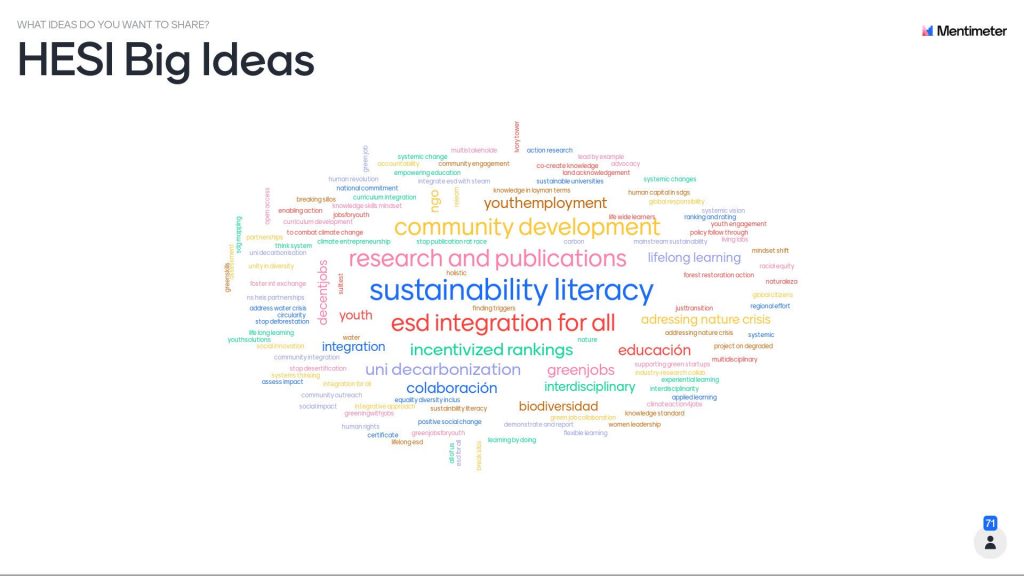 On 7 July 2021, a Special Event of the UN High-level Political Forum on Sustainable Development highlighted the critical role of further education in achieving sustainable development and ensuring a sustainable and resilient recovery from the COVID-19 pandemic. Organised by UNU-IAS and other members of the Higher Education Sustainability Initiative (HESI), the online event brought together key actors from the higher education sector to discuss how education could be redefined to deliver on these critical agendas.
On 7 July 2021, a Special Event of the UN High-level Political Forum on Sustainable Development highlighted the critical role of further education in achieving sustainable development and ensuring a sustainable and resilient recovery from the COVID-19 pandemic. Organised by UNU-IAS and other members of the Higher Education Sustainability Initiative (HESI), the online event brought together key actors from the higher education sector to discuss how education could be redefined to deliver on these critical agendas.
Through presentations and discussion participants underlined the systemic change needed to achieve the 2030 Agenda, and the importance of SDG 4 (quality education) as a key enabler. It was recognised that universities must play a significant role, as institutions that not only develop the next generation of leaders, but also drive research and policy agendas.
 Discussion Summary
Discussion Summary
As moderator of the opening session, Sam Barratt (Chief of Youth, Education and Advocacy, UNEP) outlined the impacts and current status of the COVID-19 pandemic, and stressed that actions in this decade were essential to deliver on the SDGs and tackle climate change. Panellists discussed the challenges, opportunities, and lessons learned for higher education. Stefania Giannini (Assistant Director-General for Education, UNESCO) highlighted the deepening of educational, social, and economic inequities resulting from the pandemic, and the need for university programmes to be designed to address current challenges. The Berlin Declaration on ESD, adopted at the UNESCO World Conference on ESD in May 2021, can serve as a blueprint for transforming education, to equip learners at every level with the knowledge, skills, and values to act for sustainable development.
Sophia Eriksson Waterschoot (Director for Youth, Education and Erasmus+, DG Education and Culture, European Commission) emphasised that equipping people with digital and green skills was vital to any recovery. Phoebe Kounduri (Athens University of Economics and Business; Chair of the Taskforce “Green Recovery” COVID-19 Lancet Commission) explained that a sustainability transition could only be achieved by transforming education and research, and commercialising research. She noted that it was crucial to restructure courses and research to be interdisciplinary and intra-disciplinary in order to connect to the SDGs. Emphasising the need to integrate sustainable development into curriculums, Kelo Uchendu (MOCK COP26 Campaign Coordinator & Engineer) encouraged universities to lead by example in efforts such as achieving net zero emissions. He called for greater inclusion of young people in decision-making processes, and their inputs in academic curriculum.
The second session shared innovative, scalable, multi-stakeholder initiatives driven by HESI members to support systemic change for sustainable development. Shinobu Yume Yamaguchi (Director, UNU-IAS) highlighted the global network of Regional Centres of Expertise on Education for Sustainable Development (RCEs), which translates the global agenda into local action. The majority of RCEs projects (54%) implemented during 2015–2019 (the Global Action Programme on ESD) were led by universities, illustrating their crucial role in building the capacity of local communities. She also introduced the SDG–Universities Platform (SDG–UP), a new initiative launched by UNU-IAS to mobilise universities in Japan for achieving the SDGs. This network will develop synergies with ProSPER.Net, a regional network in the Asia-Pacific linking 50 universities to integrate sustainable development into postgraduate curriculums and promote joint research.
 A wealth of ideas and initiatives were presented by other members of HESI. Considering ways for universities to decarbonise, Tim Carter (President, Second Nature) explained the need for effective network design and the presence of both institutional actors and enablers. Suzana Puerto Gonzalez (Senior Youth Employment Specialist, ILO) spoke about supporting young people’s transitions to green jobs, which depend on green skills development. Focusing on integration of ESD across all levels of education, Chandrika Bahadur (Director of SDG Academy, SDSN) noted three essential ingredients: (i) start young to build grounding and awareness, (ii) integrate across learning content, and (iii) ensure continuous lifelong learning outside of formal structures.
A wealth of ideas and initiatives were presented by other members of HESI. Considering ways for universities to decarbonise, Tim Carter (President, Second Nature) explained the need for effective network design and the presence of both institutional actors and enablers. Suzana Puerto Gonzalez (Senior Youth Employment Specialist, ILO) spoke about supporting young people’s transitions to green jobs, which depend on green skills development. Focusing on integration of ESD across all levels of education, Chandrika Bahadur (Director of SDG Academy, SDSN) noted three essential ingredients: (i) start young to build grounding and awareness, (ii) integrate across learning content, and (iii) ensure continuous lifelong learning outside of formal structures.
Reflecting on changes in the education landscape, Bea Harrison (volunteer, Teach the Future) noted the emerging emphasis on a multidisciplinary approach to climate change, coupled with the power of personal stories to engage and lead to action. Labode Popoola (Professor of Forest Economics and Sustainable Development, University of Ibadan; Vice-Chancellor of Osun State University; and Chair of SDSN Network Nigeria) called for green mindsets, and for universities to find ways to co-create and share knowledge.
In closing remarks, Sam Barratt noted the need to think more radically about the role of universities. Florencia Librizzi (Head of Program and Partnerships, SDG Academy, SDSN and Co-Chair of HESI) underlined the importance of working together, bringing human aspects and leveraging the uniqueness of individuals and groups to ensure that no one is left behind in the pursuit to achieve sustainable development.
A recording of the event is available here. HESI Partners have also compiled a Summary of Initiatives as of July 2021.
This event was organised as part of the Higher Education Sustainability Initiative (HESI), in collaboration with the UN Department of Economic and Social Affairs (DESA), UNESCO, UN Environment, UN-HABITAT, UNGC’s PRME, UNCTAD, UNITAR, and the Sustainable Development Solutions Network (SDSN). UNU-IAS is a founding member of HESI, which brings together the United Nations and higher education networks to deliver on the SDGs.
